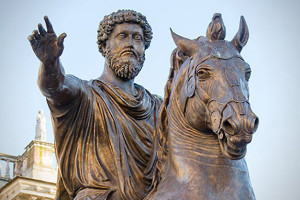After Socrates’ death, three new schools of thought were founded in Athens. All of them were influenced by Socrates’ search for what is Good.
Started by Antisthenes, a disciple of Socrates, the Cynics became widely known through the antics of Diogenes, Antisthenes’ pupil. Diogenes preached that the only path to happiness was living simply and being virtuous. He exhibited a great contempt for riches by living in a tub like a dog. this is how the Cynics got their name. Cynic comes from the Greek word meaning dog-like. One story recounts a chance meeting between Diogenes and Alexander the Great, ruler of all Greece. The king was upset by Diogenes’ seeming poverty and asked if he could do anything. “Yes, move!” Said the Cynic. “You’re blocking my sun!”
Today Stoics are people who face adversity with courage and dignity. For Zeno, the founder of the Stoics, these qualities encapsulated a whole way of life. To live virtuously meant rising above passion, to view pain and pleasure with indifference, and to help others. this was the way to true happiness. Zeno said that people’s actions were the best guide to their real characters. he pointed out that nature had given him two ears but only one mouth, and so it was better to listen than to speak. He urged his followers to study their motives and actions each day, so that they could reflect on their mistakes and regulate their future conduct accordingly.
The stoics were the first philosophers to believe in a cosmic reason at work in the universe. They argued that everything happens for a reason and that there is no such thing as chance. The stoics were the first “Determinists”. they believed that there is no such thing as free will.
Like Zeno, the philosopher Epicurus also sought inner peace through living a good life. However, he and his followers rejected the idea of fate. The original Epicureans were not hedonist (people who live for pleasure). Epicurus’ idea of pleasure was the avoidance of pain. He wanted to free people from the fear created by ignorance and superstition. He accepted the atomists’ view that all things were composed of tiny particles. He taught his disciples that dying was nothing to fear because their atoms would simply be redistributed throughout the cosmos after death.


